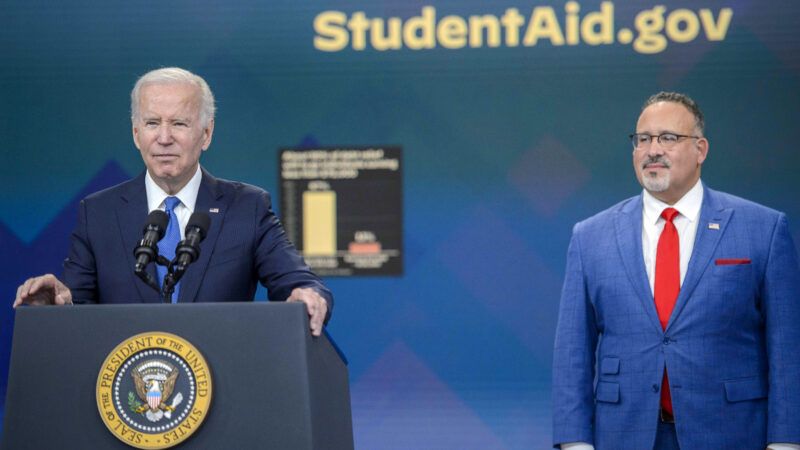Title IX Due Process Protections Could Be Wiped Away by Education Department, Report Claims
"While the procedural protections currently in place are grossly inadequate, we may soon be calling these the 'good old days.'"

College students who face sexual misconduct hearings under Title IX, the federal law that governs adjudication of such allegations, enjoyed increased due process protections for the last two years.
But these fragile gains could be wiped out entirely if the Biden Education Department delivers on its stated promise to undo the Trump administration's Title IX rule making.
"While the procedural protections currently in place are grossly inadequate, we may soon be calling these the 'good old days,'" notes a new report from the Foundation for Individual Rights and Expression (FIRE).
That report—titled "Spotlight on Campus Due Process" and published yearly by FIRE—finds that some college campuses made modest improvements to their campus disciplinary procedures following the adoption of the Trump-era revisions, which took effect in August 2020. Those revisions established that students accused of Title IX sexual misconduct were entitled to fair hearings, given the right to cross-examine their accusers, and had access to the charges and evidence against them.
The Trump-era due process innovations, approved by former Education Secretary Betsy DeVos, applied specifically to Title IX sexual misconduct. As a result, many campuses now handle other disciplinary matters—such as academic dishonesty, theft, or off-campus behavior—with totally separate procedures in which the accused is not afforded basic fairness. FIRE's report looked at the various policies of the top 53 colleges and universities as ranked by U.S. News & World Report and found that DeVos' changes had meaningfully improved the affected category—Title IX sexual misconduct—in comparison with the unaffected categories.
"Thanks to the safeguards required by the current Title IX regulations, such policies were routinely the highest scoring policies at their institutions," the report notes.
This means, of course, that absent explicit pressure from the Education Department, many institutions would happily violate students' due process rights and subject them to the kinds of Kafkaesque show trials that became common under the Obama administration's dubious Title IX guidance.
"FIRE's research shows that since the current Title IX regulations went into effect there have seen sustained, critical improvements for students' due process protections," Ryan Ansloan, a senior program officer at FIRE, tells Reason. "The Department of Education's proposed regulations threaten to reverse that progress."
Earlier this year, on the 50th anniversary of Title IX's passage, Education Secretary Miguel Cardona said he would eviscerate the due process standards established by the Trump administration. He proposed getting rid of the requirement that schools hold actual hearings with attorneys, witnesses, and cross-examination. Instead, universities would be free to bring back the single-investigator model, which empowers a lone administrator to investigate an accusation and make a determination of guilt with little input from either the accused or the accuser.
FIRE's report is an important reminder that the due process gains on campus were hard-fought: #MeToo-era activist groups fought them tooth and nail on the dubious grounds that fairly adjudicating sexual misconduct would make female students more vulnerable to rape. Civil libertarians triumphed over these illiberal notions by exposing the fundamental unfairness of a system that often deprived accused individuals of meaningful opportunities to defend themselves.
The Biden administration's decision to reaffirm both the policies and the personnel responsible for such a travesty is demoralizing. Unfortunately, there is every reason to expect that FIRE's 2023 "Spotlight on Campus Due Process" will reveal profound backsliding on this issue.


Show Comments (44)